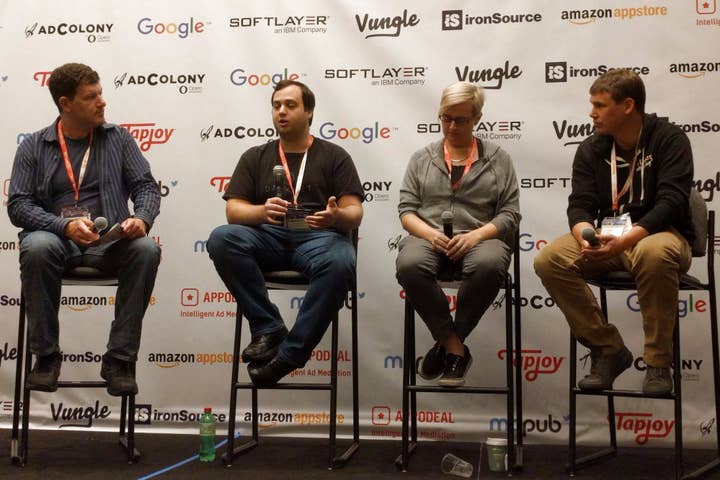Are VR exclusives bad? It's complicated
"In a lot of cases a game is not gonna be made at all unless it gets a boost from something like a timed exclusivity deal"
The recent controversy over exclusive games in VR is a consumer-led simplification of what is, at this early stage, a challenging environment in which to make games and stay profitable.
In a session at Casual Connect USA yesterday, a panel of developers tackled the main issues in the business and craft of VR games. When asked about the role and importance of platform exclusivity at this embryonic stage, Otherworld Interactive co-founder Andrew Goldstein reminded the crowd of the diversity that already exists within the VR community, pointing out that even the three panellists were operating at very different scales with very different sources of funding.
"All of our bottom lines in terms of what we need are different," Goldstein said. "What we need to make back on this, and what we need our games to do, requires a different amount. He [Edward McNeill, independent] needs less in terms of making profit than I do, which is then less than what she [Kayla Kinnunen, Roadhouse Interactive] needs.
"The VR development community is more a community of fans than it is necessarily of studios"
"And, in terms of what she's building, it might not even be about making a profit; it might be about positioning the company to be more cutting edge and tech savvy. You first have to ask the question: Why am I building this?"
For the most part, though, even VR studios with a team of, say, ten people could still largely be composed of what Goldstein described as "fans." The advent of VR was a "reset button" for the industry, creating an opportunity for enthusiastic smaller developers as larger companies prevaricated over how much to invest, or whether to invest at all.
"You had this huge opening of a lot of indie devs who loved VR, but a lot of tiny studios that haven't done a lot of game development," Goldstein continued. "The development community is more a community of fans than it is necessarily of studios."
The backlash against games like Superhot and Giant Cop taking timed exclusivity deals with Oculus - which is explained in more detail in this article, and this interview with Oculus VR's Jason Rubin - was born from the perception that these small studios were "being taken advantage of" by larger publishers. However, that doesn't necessarily reflect the point-of-view of the developers themselves, almost all of whom are motivated by the opportunity to, "make great stuff."
While nobody on the panel explicitly stated as much, the sum total of the insights offered suggested the exclusivity row hinged to some degree on ignorance among consumers of the reality of VR development. Vive owning consumers don't need to be happy that they have to wait a couple of months to play Giant Cop, but exclusive deals in VR play the same role that they once did in console - a tradition with which most gamers are familiar, and has often been held up as a point of pride rather than outrage.
One aspect of that role is to ensure that the games are made in the first place. Edward McNeill said that, as a basic principle, it was "unarguable" that exclusivity is worse for the consumer, but the simple reality is that the VR market doesn't afford the kind of freedom found in more mature platforms.
"I think a lot of gamers - especially in this recent dust up - are not entirely realistic about what's at play"
"I think a lot of gamers - especially in this recent dust up - are not entirely realistic about what's at play," he said. "In a lot of cases a game is not gonna be made at all unless it gets a boost from something like a timed exclusivity deal. A lot of times, unless a studio can ensure it will be available to survive, it won't go on to make its next game."
The driving idea behind the exclusivity backlash is apparently to ensure that all content is available to everyone. However, exclusivity is actually one of the forces that is allowing more content to be created, and for existing content to be more ambitious. And in the vast majority of cases the exclusivity is temporary, meaning that the content will still be available to everyone in the fullness of time.
"My goal as a developer is not to get rich and live a lavish lifestyle at the expense of gamers," McNeill continued. "I want to be able to keep on making games, and sometimes that might require the strategic decision to go as an exclusive. The alternative is not to just go multi-platform with everything, and make everything available to everyone.
"The alternative sometimes is to make a different game. The alternative sometimes is to quit."
GamesIndustry.biz is a media partner for Casual Connect USA. Our travel and accommodation costs were provided by the organiser.

